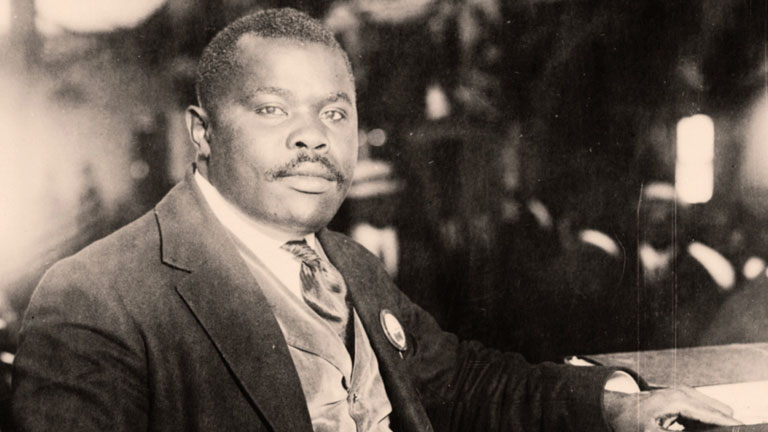
Born in Jamaica, Marcus
Garvey was an orator for the Black Nationalism and Pan-Africanism movements, to
which end he founded the Universal Negro Improvement Association and African
Communities League. Garvey advanced a Pan-African philosophy which inspired a
global mass movement, known as Garveyism. Garveyism would eventually inspire
others, from the Nation of Islam to the Rastafari movement.
Early Life
Social activist Marcus
Mosiah Garvey, Jr. was born on August 17, 1887, in St. Ann's Bay, Jamaica.
Self-educated, Garvey founded the Universal Negro Improvement Association,
dedicated to promoting African-Americans and resettlement in Africa. In the
United States he launched several businesses to promote a separate black
nation. After he was convicted of mail fraud and deported back to Jamaica, he
continued his work for black repatriation to Africa.
Marcus Mosiah Garvey
was the last of 11 children born to Marcus Garvey, Sr. and Sarah Jane Richards.
His father was a stone mason, and his mother a domestic worker and farmer.
Garvey, Sr. was a great influence on Marcus, who once described him as
"severe, firm, determined, bold, and strong, refusing to yield even to
superior forces if he believed he was right." His father was known to have
a large library, where young Garvey learned to read.
At age 14, Marcus
became a printer's apprentice. In 1903, he traveled to Kingston, Jamaica, and
soon became involved in union activities. In 1907, he took part in an
unsuccessful printer's strike and the experience kindled in him a passion for
political activism. Three years later, he traveled throughout Central America
working as an newspaper editor and writing about the exploitation of migrant
workers in the plantations. He later traveled to London where he attended
Birkbeck College (University of London) and worked for the African Times and
Orient Review, which advocated Pan-African nationalism.
Founding the United
Negro Improvement Association
Inspired by these experiences,
Marcus Garvey returned to Jamaica in 1912 and founded the Universal Negro
Improvement Association (UNIA) with the goal of uniting all of African diaspora
to "establish a country and absolute government of their own." After
corresponding with Booker T. Washington, the American educator who founded
Tuskegee Institute, Garvey traveled to the United States in 1916 to raise funds
for a similar venture in Jamaica. He settled in New York City and formed a UNIA
chapter in Harlem to promote a separatist philosophy of social, political, and
economic freedom for blacks. In 1918, Garvey began publishing the widely
distributed newspaper Negro World to convey his message.
By 1919, Marcus Garvey
and UNIA had launched the Black Star Line, a shipping company that would
establish trade and commerce between Africans in America, the Caribbean, South
and Central America, Canada and Africa. At the same time, Garvey started the
Negros Factories Association, a series of companies that would manufacture
marketable commodities in every big industrial center in the Western hemisphere
and Africa.
In August 1920, UNIA
claimed 4 million members and held its first International Convention at
Madison Square Garden in New York City. Before a crowd of 25,000 people from
all over world, Marcus Garvey spoke of having pride in African history and
culture. Many found his words inspiring, but not all. Some established black
leaders found his separatist philosophy ill-conceived. W.E.B. Du Bois, a
prominent black leader and officer of the N.A.A.C.P. called Garvey, "the
most dangerous enemy of the Negro race in America." Garvey felt Du Bois
was an agent of the white elite.
Charges and Loss of
Authority
In 1922, Marcus Garvey
and three other UNIA officials were charged with mail fraud involving the Black
Star Line. The trial records indicate several improprieties occurred in the
prosecution of the case. It didn't help that the shipping line's books
contained many accounting irregularities. On June 23, 1923, Garvey was
convicted and sentenced to prison for five years. Claiming to be a victim of a
politically motivated miscarriage of justice, Garvey appealed his conviction,
but was denied. In 1927 he was released from prison and deported to Jamaica.
Garvey continued his
political activism and the work of UNIA in Jamaica, and then moved to London in
1935. But he did not command the same influence he had earlier. Perhaps in
desperation or maybe in delusion, Garvey collaborated with outspoken
segregationist and white supremacist Senator Theodore Bilbo of Mississippi to
promote a reparations scheme. The Greater Liberia Act of 1939 would deport 12
million African-Americans to Liberia at federal expense to relieve
unemployment. The act failed in Congress, and Garvey lost even more support
among the black population.
Death and Legacy
Marcus Garvey died in
London in 1940 after several strokes. Due to travel restrictions during World
War II, his body was interred in London. In 1964, his remains were exhumed and
taken to Jamaica, where the government proclaimed him Jamaica's first national
hero and re-interred him at a shrine in the National Heroes Park. But his
memory and influence remain. His message of pride and dignity inspired many in
the early days of the Civil Rights movement in the 1950s and 1960s. In tribute
to his many contributions, Garvey's bust has been displayed in the Organization
of American States' Hall of Heroes in Washington, D.C. The country of Ghana has
named its shipping line the Black Star Line and its national soccer team the
Black Stars, in honor of Garvey.

No comments:
Post a Comment